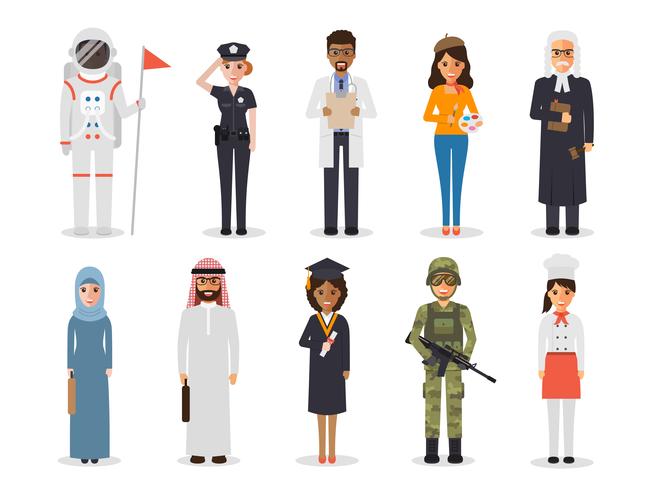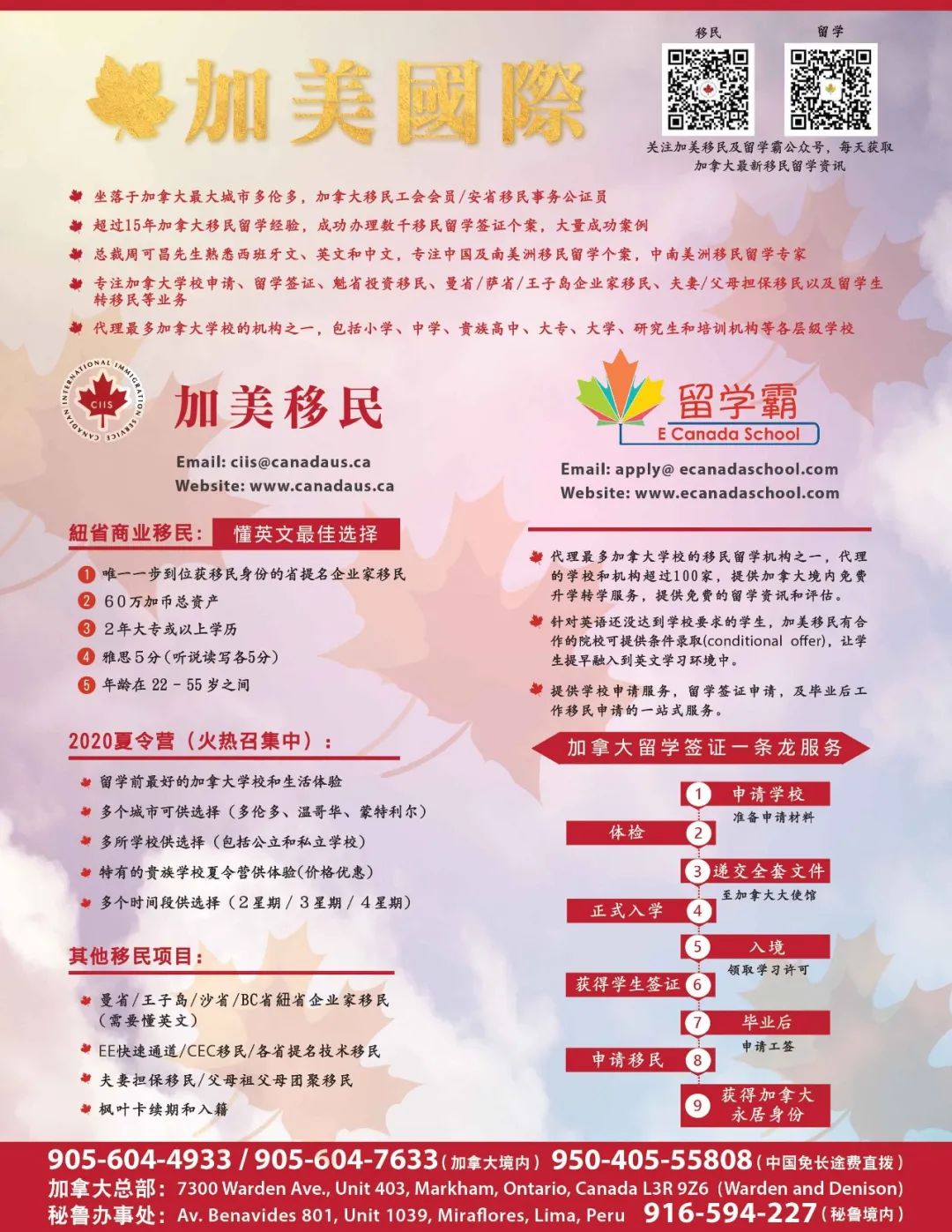Scan


In our life, we will face many important choices. One of them is to choose the major or career you want to study in the third year of high school. As the saying goes: "A man is afraid of entering the wrong line." If you choose the right major, you can take fewer detours in the future to avoid the inconvenience that the major brings to you. Whether you fill out the volunteer after completing the college entrance examination in China or sign up for the university and major you want to study after finishing the 12th grade in Canada, this is a link to be carefully considered. We often hear people say that they like what they like, but there are many things we like to do. After graduation, I also have a lot of things that I like to do. Therefore, we must also consider whether it is suitable for ourselves. We all want to do work that we like to do and make ourselves happy, but when you do work that you have never done before, how do you make sure you like that job? Study Abroad will make some suggestions for the 12th grade to choose to suit their own profession.

1) Evaluate yourself: First, you must know your strengths, skills and what you are good at. So, you can choose a career that matches your strengths and skills. You can explore the following questions: What subjects do you like and why do you like them? Are the scores of those subjects higher and why? Is it the same job you want to do and what you need to do every day? Since the Canadian high school courses are self-selected except for a few compulsory courses, students should understand their own strengths as early as possible, and do not find that their grades do not reach the university they want to study in until grade 12. The subjects I like sometimes are not necessarily the ones with the highest grades, but the subjects with the highest grades are good at myself. It is recommended that students report subjects that they are good at and have advantages. Although you can transfer to a major in a university or college in Canada, if you are not good at it, you will study harder and will waste time to transfer to the major. Because in Canada, if the grade 12 average score and requirements are met, the university or college will be admitted. Since Canadian schools do not rank students in the class, how do you know what class you are good at? Here it is recommended that students in the upper grades can compare the scores of the courses they have read with the median of this course. Higher than the median means that you are in the middle and upper reaches of the class, and lower than the median is in the middle and lower reaches. In addition, students can also do a SWOT analysis and list their own advantages, disadvantages, opportunities and threats in external competition. The threat here can be the fierce competition in the job you want to do, which may be replaced by technology.
2) In line with your own interests: It is recommended that high school students do different personal personality tests online, which not only allows us to understand ourselves better but also knows what type of work is suitable for us. A more famous test is RIASEC / Hollandinterest scale, which outlines six common personality types, such as investigative, social, or artistic, and enables you to browse occupations that match your personality based on your personality type. If you have narrowed the scope of a job or occupation, you can do some surveys about the occupation online, for example, from job description to average salary and estimated future growth. This allows you to understand whether the stability, risks, and wages of the industry you want to engage in meet your own ideals.

3) List 2-5 best occupations: when you understand your skills, strengths and interests. Based on these several best careers. Before this, you can first list a list of industries, at least 10, and then break down some occupations in it. For example, your ideal job is to be a teaching assistant. You see job descriptions in preschool education and education. Later, you found that the job of an IT trainer is more suitable for your own interests and strengths, so maybe you also like the industry about technology. After choosing a career that suits you, you must learn the relevant skills. In high school, it is undoubtedly that you need to choose the courses you need. For example, students who want to study computer must choose mathematics and chemistry. If you know someone, you can also ask them for information about the profession, so that it is very clear what the profession needs to do every day and whether it really matches itself.
4) Set your own goals: After choosing a career, you need to think about some long-term and short-term goals that can be achieved, and some can help you achieve your ideal job goals. For example, take a high score in an exam or project, participate in some volunteers to learn the skills required in the profession, do some research on the course, learn some extracurricular classes, etc. Goals can be achieved within a year or within a day, but they must be achievable.
The following are the top Canadian professional rankings and universities published by Maclean Magazine:
商科(Business) |
1. University of British Columbia--英属哥伦比亚大学 |
2. University of Toronto—多伦多大学 |
3. York University—约克大学 |
4. University of Alberta --阿尔伯塔大学 |
5. University of Western Ontario—西安大略大学 |
6. McGill University--麦吉尔大学 |
7. Queen’s University—女王大学 |
8. University of Montreal—蒙特利尔大学 |
9. McMaster University--麦克马斯特大学 |
10. Simon Fraser University—西门菲莎大学 |
Engineering (工程学) |
1. University of Toronto—多伦多大学 |
2. University of British Columbia--英属哥伦比亚大学 |
3. University of Waterloo—滑铁卢大学 |
4. McGill University--麦吉尔大学 |
5. University of Alberta --阿尔伯塔大学 |
6. University of Montreal—蒙特利尔大学 |
7. *Carleton University—卡尔顿大学 |
8. *McMaster University--麦克马斯特大学 |
9. *Queen’s University—女王大学 |
10. *University of Victoria—维多利亚大学 |
Environmental Science (环境科学) |
1. University of British Columbia--英属哥伦比亚大学 |
2. University of Toronto—多伦多大学 |
3. McGill University--麦吉尔大学 |
4. University of Alberta --阿尔伯塔大学 |
5. University of Waterloo—滑铁卢大学 |
6. Guelph University—奎尔夫大学 |
7. Dalhousie University—达尔豪斯大学 |
8. University of Saskatchewan--萨斯喀彻温大学 |
9. University of Victoria—维多利亚大学 |
10. Simon Fraser University—西门菲莎大学 |
Mathematics (数学) |
1. *University of British Columbia--英属哥伦比亚大学 |
2. *University of Toronto—多伦多大学 |
3. University of Waterloo—滑铁卢大学 |
4. McGill University--麦吉尔大学 |
5. University of Alberta --阿尔伯塔大学 |
6. University of Montreal—蒙特利尔大学 |
7. McMaster University--麦克马斯特大学 |
8. University of Victoria—维多利亚大学 |
9. Simon Fraser University—西门菲莎大学 |
Education (教育学) |
1. University of Toronto—多伦多大学 |
2. University of British Columbia--英属哥伦比亚大学 |
3. University of Alberta --阿尔伯塔大学 |
4. McGill University--麦吉尔大学 |
5. University of Calgary—卡尔加里大学 |
6. Simon Fraser University—西门菲莎大学 |
7. University of Ottawa-- 渥太华大学 |
8. University of Victoria—维多利亚大学 |
9. University of Western Ontario—西安大略大学 |
10. *Concordia University—康考迪亚大学 |
Computer Science (电脑) |
1. University of Toronto—多伦多大学 |
2. University of British Columbia--英属哥伦比亚大学 |
3. University of Waterloo—滑铁卢大学 |
4. University of Montreal—蒙特利尔大学 |
5. McGill University--麦吉尔大学 |
6. University of Alberta --阿尔伯塔大学 |
7. Simon Fraser University—西门菲莎大学 |
8. McMaster University--麦克马斯特大学 |
9. University of Ottawa-- 渥太华大学 |
10. Carleton University—卡尔顿大学 |
Psychology (心理学) |
1. University of British Columbia--英属哥伦比亚大学 |
2. University of Toronto—多伦多大学 |
3. McGill University--麦吉尔大学 |
4. University of Waterloo—滑铁卢大学 |
5. University of Western Ontario—西安大略大学 |
6. Queen’s University—女王大学 |
7. Dalhousie University—达尔豪斯大学 |
8. McMaster University--麦克马斯特大学 |
9. *University of Alberta --阿尔伯塔大学 |
10. *University of Calgary— 卡尔加里大学 |
E-Canada School provides a one-stop service for students to apply for a study visa and immigration. Welcome to contact us. We will analyze the applicants in detail and tailor the most suitable study abroad immigration program for you.
